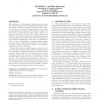Free Online Productivity Tools
i2Speak
i2Symbol
i2OCR
iTex2Img
iWeb2Print
iWeb2Shot
i2Type
iPdf2Split
iPdf2Merge
i2Bopomofo
i2Arabic
i2Style
i2Image
i2PDF
iLatex2Rtf
Sci2ools
115
click to vote
GECCO
2005
Springer
2005
Springer
Evolutionary testing of state-based programs
The application of Evolutionary Algorithms to structural test data generation, known as Evolutionary Testing, has to date largely focused on programs with input-output behavior. However, the existence of state behavior in test objects presents additional challenges for Evolutionary Testing, not least because certain test goals may require a search for a sequence of inputs to the test object. Furthermore, statebased test objects often make use of internal variables such as boolean flags, enumerations and counters for managing or querying their internal state. These types of variables can lead to a loss of information in computing fitness values, producing coarse or flat fitness landscapes. This results in the search receiving less guidance, and the chances of finding required test data are decreased. This paper proposes an extended approach based on previous works. Input sequences are generated, and internal variable problems are addressed through hybridization with an extended Ch...
Related Content
| Added | 27 Jun 2010 |
| Updated | 27 Jun 2010 |
| Type | Conference |
| Year | 2005 |
| Where | GECCO |
| Authors | Phil McMinn, Mike Holcombe |
Comments (0)

